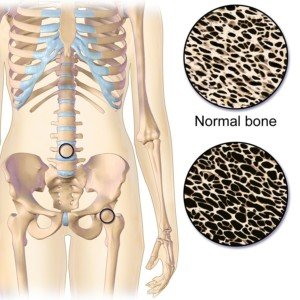You need not be old to get osteoporosis; brittle bones can affect 30-year-olds too. There are many reasons people in their 30’s can get osteoporosis.
Osteoporosis at Age 30
“Osteoporosis is not at all typical at age 30 but can be caused at a young age by a number of things,” says Arielle Levitan, MD, board certified in internal medicine and co-founder of Vous Vitamin LLC and co-author of “The Vitamin Solution: Two Doctors Clear the Confusion About Vitamins and Your Health.”
“Being hyperthyroid (often due to something called Graves disease) or taking too much thyroid hormone can cause bone loss,” says Dr. Levitan.
“Other conditions that lead to poor absorption of vitamins such as celiac disease, Crohn’s disease, or people who have had intestinal bypass surgery can lead to osteoporosis.” 30 years old
In celiac disease, which is one of the most under-diagnosed and misdiagnosed conditions, the body “thinks” that gluten—a substance in wheat—is a foreign invader.
The immune system springs into action to fight off this wheat protein.
However, over a long period of time, this immune response will damage the intestinal tract, impairing its ability to absorb calcium, which bones need.
Many people who have celiac disease do not know it, and it doesn’t always cause noticeable symptoms.
“Another common cause of increased bone loss is hyperparathyroidism, which is overactivity of the parathyroid glands that normally help regulate calcium and vitamin D metabolism,” says Dr. Levitan.
“Vitamin D deficiency or lack of dietary calcium can also cause osteoporosis, but would have to be severely lacking to cause osteoporosis at such a young age.
“It is very important in one’s 30’s that you are getting adequate amounts of calcium and vitamin D to build your bones to peak strength. This can best be done via a personalized multivitamin.”
In addition, strength training is a must to preserve bone density. Most men, and especially women, do not lift weights.

Freepik.com
Weight-bearing exercise strengthens bones by forcing them to adapt to the stress of muscles pulling them.
Bones do not pull muscles; muscles pull bones – and this makes them stronger. So hit the weights!
Emphasis should be on the lower body, and the muscles of the upper body to focus on would be those of the back, chest and shoulders.
 Dr. Levitan is board certified in internal medicine and has a special interest in women’s health and preventive medicine.
Dr. Levitan is board certified in internal medicine and has a special interest in women’s health and preventive medicine.
 Lorra Garrick is a former personal trainer certified through the American Council on Exercise. At Bally Total Fitness she trained women and men of all ages for fat loss, muscle building, fitness and improved health.
Lorra Garrick is a former personal trainer certified through the American Council on Exercise. At Bally Total Fitness she trained women and men of all ages for fat loss, muscle building, fitness and improved health.
.



























